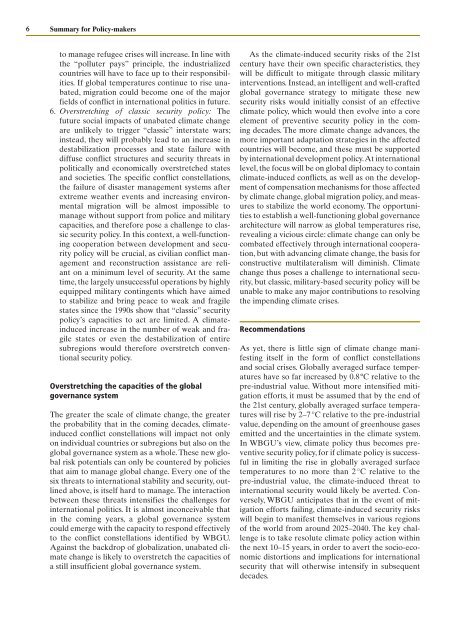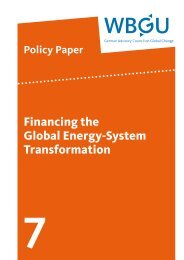World in Transition: Climate Change as a Security Risk - WBGU
World in Transition: Climate Change as a Security Risk - WBGU
World in Transition: Climate Change as a Security Risk - WBGU
You also want an ePaper? Increase the reach of your titles
YUMPU automatically turns print PDFs into web optimized ePapers that Google loves.
6 Summary for Policy-makers<br />
to manage refugee crises will <strong>in</strong>cre<strong>as</strong>e. In l<strong>in</strong>e with<br />
the “polluter pays” pr<strong>in</strong>ciple, the <strong>in</strong>dustrialized<br />
countries will have to face up to their responsibilities.<br />
If global temperatures cont<strong>in</strong>ue to rise unabated,<br />
migration could become one of the major<br />
fields of conflict <strong>in</strong> <strong>in</strong>ternational politics <strong>in</strong> future.<br />
6. Overstretch<strong>in</strong>g of cl<strong>as</strong>sic security policy: The<br />
future social impacts of unabated climate change<br />
are unlikely to trigger “cl<strong>as</strong>sic” <strong>in</strong>terstate wars;<br />
<strong>in</strong>stead, they will probably lead to an <strong>in</strong>cre<strong>as</strong>e <strong>in</strong><br />
destabilization processes and state failure with<br />
diffuse conflict structures and security threats <strong>in</strong><br />
politically and economically overstretched states<br />
and societies. The specific conflict constellations,<br />
the failure of dis<strong>as</strong>ter management systems after<br />
extreme weather events and <strong>in</strong>cre<strong>as</strong><strong>in</strong>g environmental<br />
migration will be almost impossible to<br />
manage without support from police and military<br />
capacities, and therefore pose a challenge to cl<strong>as</strong>sic<br />
security policy. In this context, a well-function<strong>in</strong>g<br />
cooperation between development and security<br />
policy will be crucial, <strong>as</strong> civilian conflict management<br />
and reconstruction <strong>as</strong>sistance are reliant<br />
on a m<strong>in</strong>imum level of security. At the same<br />
time, the largely unsuccessful operations by highly<br />
equipped military cont<strong>in</strong>gents which have aimed<br />
to stabilize and br<strong>in</strong>g peace to weak and fragile<br />
states s<strong>in</strong>ce the 1990s show that “cl<strong>as</strong>sic” security<br />
policy’s capacities to act are limited. A climate<strong>in</strong>duced<br />
<strong>in</strong>cre<strong>as</strong>e <strong>in</strong> the number of weak and fragile<br />
states or even the destabilization of entire<br />
subregions would therefore overstretch conventional<br />
security policy.<br />
Overstretch<strong>in</strong>g the capacities of the global<br />
governance system<br />
The greater the scale of climate change, the greater<br />
the probability that <strong>in</strong> the com<strong>in</strong>g decades, climate<strong>in</strong>duced<br />
conflict constellations will impact not only<br />
on <strong>in</strong>dividual countries or subregions but also on the<br />
global governance system <strong>as</strong> a whole. These new global<br />
risk potentials can only be countered by policies<br />
that aim to manage global change. Every one of the<br />
six threats to <strong>in</strong>ternational stability and security, outl<strong>in</strong>ed<br />
above, is itself hard to manage. The <strong>in</strong>ter action<br />
between these threats <strong>in</strong>tensifies the challenges for<br />
<strong>in</strong>ternational politics. It is almost <strong>in</strong>conceivable that<br />
<strong>in</strong> the com<strong>in</strong>g years, a global governance system<br />
could emerge with the capacity to respond effectively<br />
to the conflict constellations identified by <strong>WBGU</strong>.<br />
Aga<strong>in</strong>st the backdrop of globalization, unabated climate<br />
change is likely to overstretch the capacities of<br />
a still <strong>in</strong>sufficient global governance system.<br />
As the climate-<strong>in</strong>duced security risks of the 21st<br />
century have their own specific characteristics, they<br />
will be difficult to mitigate through cl<strong>as</strong>sic military<br />
<strong>in</strong>terventions. Instead, an <strong>in</strong>telligent and well-crafted<br />
global governance strategy to mitigate these new<br />
security risks would <strong>in</strong>itially consist of an effective<br />
climate policy, which would then evolve <strong>in</strong>to a core<br />
element of preventive security policy <strong>in</strong> the com<strong>in</strong>g<br />
decades. The more climate change advances, the<br />
more important adaptation strategies <strong>in</strong> the affected<br />
countries will become, and these must be supported<br />
by <strong>in</strong>ternational development policy. At <strong>in</strong>ternational<br />
level, the focus will be on global diplomacy to conta<strong>in</strong><br />
climate-<strong>in</strong>duced conflicts, <strong>as</strong> well <strong>as</strong> on the development<br />
of compensation mechanisms for those affected<br />
by climate change, global migration policy, and me<strong>as</strong>ures<br />
to stabilize the world economy. The opportunities<br />
to establish a well-function<strong>in</strong>g global governance<br />
architecture will narrow <strong>as</strong> global temperatures rise,<br />
reveal<strong>in</strong>g a vicious circle: climate change can only be<br />
combated effectively through <strong>in</strong>ternational cooperation,<br />
but with advanc<strong>in</strong>g climate change, the b<strong>as</strong>is for<br />
constructive multilateralism will dim<strong>in</strong>ish. <strong>Climate</strong><br />
change thus poses a challenge to <strong>in</strong>ternational security,<br />
but cl<strong>as</strong>sic, military-b<strong>as</strong>ed security policy will be<br />
unable to make any major contributions to resolv<strong>in</strong>g<br />
the impend<strong>in</strong>g climate crises.<br />
Recommendations<br />
As yet, there is little sign of climate change manifest<strong>in</strong>g<br />
itself <strong>in</strong> the form of conflict constellations<br />
and social crises. Globally averaged surface temperatures<br />
have so far <strong>in</strong>cre<strong>as</strong>ed by 0.8 ºC relative to the<br />
pre-<strong>in</strong>dustrial value. Without more <strong>in</strong>tensified mitigation<br />
efforts, it must be <strong>as</strong>sumed that by the end of<br />
the 21st century, globally averaged surface temperatures<br />
will rise by 2–7 °C relative to the pre-<strong>in</strong>dustrial<br />
value, depend<strong>in</strong>g on the amount of greenhouse g<strong>as</strong>es<br />
emitted and the uncerta<strong>in</strong>ties <strong>in</strong> the climate system.<br />
In <strong>WBGU</strong>’s view, climate policy thus becomes preventive<br />
security policy, for if climate policy is successful<br />
<strong>in</strong> limit<strong>in</strong>g the rise <strong>in</strong> globally averaged surface<br />
temperatures to no more than 2 °C relative to the<br />
pre-<strong>in</strong>dustrial value, the climate-<strong>in</strong>duced threat to<br />
<strong>in</strong>ternational security would likely be averted. Conversely,<br />
<strong>WBGU</strong> anticipates that <strong>in</strong> the event of mitigation<br />
efforts fail<strong>in</strong>g, climate-<strong>in</strong>duced security risks<br />
will beg<strong>in</strong> to manifest themselves <strong>in</strong> various regions<br />
of the world from around 2025–2040. The key challenge<br />
is to take resolute climate policy action with<strong>in</strong><br />
the next 10–15 years, <strong>in</strong> order to avert the socio-economic<br />
distortions and implications for <strong>in</strong>ternational<br />
security that will otherwise <strong>in</strong>tensify <strong>in</strong> subsequent<br />
decades.
















